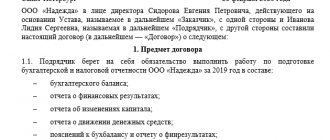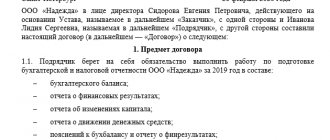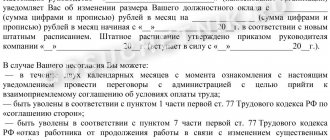Employment contract
Before signing an employment contract, the employer and employee must know the basic rules that both parties are required to comply with.
According to the employment contract: 1. The employee is obliged to adhere to the generally accepted internal regulations and rules of the organization, to work according to a certain schedule, which was established when hired in personnel documents.
2. The employee is obliged to personally perform the work and duties provided for by his regular position (engineer, programmer, etc.)
3. According to the legislation of the Russian Federation, an employment contract can be concluded both for an indefinite period and for a period of no more than 5 years (such an employment contract is considered fixed-term).
4. According to the employment contract, the employee is required to pay wages at least 2 times a month, that is, an advance or salary for the first half of the month and a monthly salary.
5. The employer must withhold personal income tax and pay insurance contributions to the Pension Fund, Compulsory Medical Insurance Fund and Social Insurance Fund.
6. According to the employment contract, the employee occupies a position in the hierarchical scheme, that is, he is subordinate to the employer.
Benefits for the employee:
- according to the employment contract, the employee is required to provide a salary that must be at least 11,163 rubles, which is the minimum wage (minimum wage), effective from May 1, 2021;
- the employee increases his seniority, which will affect his pension fund in the future;
- the employee is provided with a social package, which gives him a dismissal benefit, days off, business trips, paid leave, financial assistance, bonuses, etc.;
- hiring an employee and including him in the organizational chart of the organization.
Disadvantages for the employee: the employee has clear regulations that he must adhere to.
Advantages for the employer: the employee is obliged to comply with local regulations of the enterprise, company rules and job descriptions. For failure to comply with these rules, the employer has the right to issue a reprimand, including in the form of dismissal. That is, the employer has more power and leverage over the employee.
Disadvantages for the employer:
- it is necessary to pay the employee a salary at least twice a month;
- it is necessary to create conditions for the work of a full-time employee: provide a workplace that must be equipped with all the necessary elements to perform their tasks;
- It is necessary to maintain all personnel documentation for all employees of your organization.
An employment contract can be terminated at the initiative of the employee or the employer, by agreement of the two parties, upon expiration of the contract, due to the employee’s health and transfer to another job, etc.
Decor
Depending on the scale of the work, the parties choose a design option from among:
- Compiled in simple written form , including at the discretion of provisions, clauses and sub-clauses.
- Draw up and print on a sheet of A-4 format, sealed with the signatures of the parties . For legal entities, a stamp is required.
- Additionally, it is certified at a notary office .
For registration, the text of the agreement is developed, which is prepared in 2 copies and previously discussed by the parties, with the introduction and modification of individual clauses, provisions or the entire text.
IMPORTANT: Make sure that the agreement does not carry the functions of an employment contract and does not include its specific provisions and wording.
Many enterprises develop standard contract forms that are filled out when hiring an employee. In this case, all that remains is to enter the required information and generate the document.
It begins with the name, date of signing and registration number. Next, the parties are identified and the subject of the agreement is established. It becomes the type of work that requires the involvement of specialists or workers.
After its definition, individual provisions determine the rules and nuances of its operation .
ATTENTION! All provisions specified in the agreement, signed by the parties themselves, are subject to mandatory execution.
You must carefully review its text to avoid risks.
The provisions contain unified requirements, which include:
- rights and obligations of the parties;
- responsibility for the work;
- rules and conditions of mutual settlement;
- work acceptance rules;
- quality of services provided, quality criteria;
- provision of equipment and materials;
- responsibility for necessary expenses;
- financial liability for damage to equipment;
- terms of termination of the agreement;
- actions of the parties in force majeure situations;
- conditions for unilateral termination and termination by agreement of the parties.
At the discretion of the parties, depending on the functions and purposes of the document, it provides for the addition of specific clauses and selection of suitable ones.
GPC agreement
When concluding a civil law agreement (hereinafter referred to as the civil law agreement), the employer does not enter into an employment relationship with the contractor. They agree on specific work, services, the deadline for their completion and the price for them. According to the GPC agreement:
- The performing person performs pre-agreed work or services, and he is not subject to the internal corporate rules and labor regulations of the organization.
- When concluding a contract, specific deadlines for the execution of the contract are immediately discussed and agreed upon, after which the work must be completed.
- Under the GPC agreement, the procedure for paying wages can be determined by agreement of the parties.
- The employer must withhold personal income tax, pay contributions to the Pension Fund and the Compulsory Medical Insurance Fund, but at the same time he does not pay contributions to the Social Insurance Fund (exception: the employer is obliged to pay contributions for injuries if this is specified in the contract).
Benefits for the employer:
- under the contract, the GPC may not issue a social package to the executor;
- there is no need to provide a workplace to the person performing the work;
- gets rid of the transfer of insurance premiums to the Social Insurance Fund (unless otherwise specified in the contract).
Disadvantages for the employer:
- cannot monitor the work progress of a freelance employee;
- does not have the right to involve an employee in the internal regulations of the company.
Benefits for the performer:
- you can combine work in several places;
- You can involve third parties to perform work (subcontractors).
Disadvantages for the performer:
- lack of social package;
- The customer can terminate the contract at any time. A situation may arise that the employee was not paid for the work he performed, then the employee can receive money through the court by proving that the contract was terminated without good reason and the work was completed in full.
Materials from the newspaper “Progressive Accountant”,
Open access to the closed part of “Clerk” with a “Premium” subscription. Get hundreds of webinars and online courses, unlimited consultations and other proprietary content for accountants.
Hurry up to subscribe with a 20% discount until October 15, 2021. Read more about “Premium” here.
Concept and types of civil law type of document
A civil law contract (CLA) is an agreement that can be concluded between a FL and a LE, a FL and a FL, a LE and a LE. This document records the emergence of labor relations, their changes and termination. The concept of GPA is disclosed in Article 420 of the Civil Code of the Russian Federation. The clauses of the agreement can be changed at the request of the parties, if this does not contradict the law (according to Article 421 of the Civil Code of the Russian Federation). The agreement differs in its content:
- Transfer of property (for example, purchase and sale).
- Execution of certain works.
- Provision of services.
The conclusion of the agreement is regulated by Article 432 of the Civil Code of the Russian Federation. GPD includes a contract (Article 702 of the Civil Code of the Russian Federation) and a contract for the provision of services for which remuneration is expected (Article 779 of the Civil Code of the Russian Federation).
Summary
In fact, it is not so difficult to distinguish a civil transaction from an employment contract. In the first case, the “Contractor” is not obliged to adhere to the internal rules, but at the same time he does not have the right to count on receiving wages and social benefits - only on payment for the agreed work.
When concluding an employment contract, the employee undertakes to observe the working hours, adhere to the rules adopted by the enterprise and receive wages for this, go on vacation and sick leave.
The employee is required to perform his job duties personally. And the “Contractor,” unless other conditions are specified in the agreement, may delegate the work to a third party.
Job responsibilities
The difference between an employment agreement and an employment contract is that the conclusion of an agreement involves the performance of a specific type of work. And when concluding a contract, the employee is not obliged to perform uniform and clearly defined functions. For example, the responsibilities of a sales manager may include not only selling goods, but also collecting accounts receivable, writing claims and letters.
If an agreement has been concluded to repair the roof, then asking such a person to repair the toilet will no longer be possible, since this is not provided for by the terms of the deal.
The danger of making the wrong choice
An employment contract without a work book, replacing a contract with an agreement - these are very dangerous paths for employers. It should be understood that the tax service and other regulatory authorities are quite scrupulous in checking the fact of employment of each employee.
Quite often, out of ignorance or intentionally, the employer replaces concepts, contracts with agreements. After all, to be honest, not all employees received higher education and came into contact with at least the basics of jurisprudence. There are quite a large number of such cases being considered in the courts.
However, even if the employee does not understand anything, if such a substitution is discovered by the tax authorities or other regulatory authorities, the employer will face a fine of up to 30 thousand rubles, and a fine of 1 thousand rubles will be imposed on the official himself.
Pros and cons of a civil contract
Civil contracts are becoming increasingly popular. And there are reasons for this.
For the employer
GPA is characterized by the following advantages:
- The employee has obligations. He must complete the work efficiently and on time.
- There is no need to set up a workplace, provide a social package, or make contributions to health and social insurance.
- Tax benefits. In particular, there is no need to pay unified social tax.
- The employer does not pay for the work process, but exclusively for the result.
However, GPA is not without its drawbacks:
- It is impossible to control the work of an employee.
- It is difficult to hold an employee accountable for violating the routine.
GPA does not imply great responsibility on the part of the employer, but it also lacks tools for control over employees.
Not a salary, but a reward
Let's give another example. The organization rents space in a building built at the beginning of the 20th century. And due to the dilapidation of the wiring, the electrical network constantly breaks down. But management considers it unprofitable to keep an electrician on staff, so a specialist is hired for repair and restoration work under a contract.
On the eve of the celebration on February 23, the head of the administrative and economic department addressed the management with a request to pay the electrician a bonus in accordance with the Regulations on bonuses in force in this organization. The bonus was paid to the electrician on the basis of a general order for the organization, along with other male employees.
Finding such documents during an inspection also means a sure path to a fine. Moreover, there are several errors here. Firstly, local regulations in force in an organization apply only to its employees, who are not an electrician-contractor (Article 11 of the Labor Code of the Russian Federation). That is, by applying the rules of the Bonus Regulations to him, the organization actually recognized that he was an employee and, by its actions, reclassified the contract.
Secondly, such a premium is a violation of the contract. After all, according to it, the contractor receives a clearly defined amount of payment for an equally clearly defined amount of work (Article 709 of the Civil Code of the Russian Federation). And the basis for payment is the signing of the work completion certificate. Therefore, we can talk about a bonus in the case of a contractor only in one case: if he completed an additional amount of work and the customer accepted this work.
A consequence of the above is another rule: in a contract agreement, the payment of remuneration to the contractor cannot be timed to coincide with the payment of wages to full-time employees. The contractor can receive his money either in advance within the period fixed in the contract, or upon completion and acceptance of the agreed amount of work. Moreover, in the case of an advance payment, it is also highly recommended to associate the date of its issuance not just with this or that day (date), but with an event - for example, the completion of part of the work, or the conclusion of an agreement. For example, the following formulation is acceptable. “Payment for the work is made in two stages: 30 percent of the remuneration is paid no later than ten working days from the date of conclusion of this contract, the remaining part is paid no later than ten working days from the date the customer accepts the results of the work.”
Subject of the transaction
If an employment contract is being drawn up, the subject of such an agreement is the process itself. When concluding an agreement, the main thing is the material result of the service or work.
In practice, many workers manage to not produce any results and stay at work for a long time, receiving wages. In the case of concluding a civil law transaction, this will not work, since payment will still be made after receiving the result that should be received by the “Customer” in the end.
What conclusions can be drawn?
To prove the validity of non-charge of insurance premiums, it is not enough to refer to the name of the contract and the presence in it of conditions regarding the non-provision of paid leave to an individual and the non-payment of benefits due to disability. Also, the argument about the absence of a corresponding position in the staffing table of the enterprise has no independent significance.
When considering disputes, courts make decisions taking into account the complex of existing circumstances. Therefore, in judicial practice there are examples when arbitrators sided with organizations, despite the ongoing nature of the disputed contracts.
There is no point in counting on judicial protection if it follows from the contract that the purpose of its conclusion is the continuous process of performing the relevant work and providing services, and not one-time tasks and payment to the contractor is made monthly in a certain amount.
Construction: accounting and taxation, No. 10, 2020








